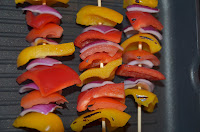History of Vegetable Kebabe

The origin of kebab may lie in the short supply of cooking fuel in the Near East, which made the cooking of large foods difficult, while urban economies made it easy to obtain small cuts of meat at a butcher's shop. The phrase is essentially Persian in origin and Arabic tradition has it that the dish was invented by medieval Persian soldiers who used their swords to grill meat over open-field fires. According to Ibn Battuta, a Moroccan traveller, in India, kebab was served in the royal houses during the Delhi Sultanate period (1206-1526 AD), and even commoners would enjoy it for breakfast with naan. The dish has been native to the Near East and ancient Greece since antiquity; an early variant of kebab (Ancient Greek is attested in Greece since 8th century BCE (archaic period) in Homer’s Iliad and Odyssey and in classical Greece, amongst others in the works of Aristophanes, Xenophon and Aristotle. Excavations held in Akrotiri on the Greek island of Santorini by professor Christos G. Doumas, unearthed stone sets of barbecue for skewers Ancient Greek used before the 17th century BCE. In each pair of the supports, the receptions for the spits are found in absolute equivalence, while the line of small openings in the base constitutes mechanism of supplying the coals with oxygen so that they are maintained light up during its use.


Comments
Post a Comment